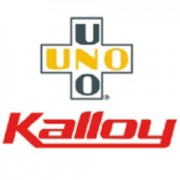|
|
|
 Optimal Stiffness Construction Optimal Stiffness Construction
According to CEN standards, stem and handlebar should be installed and tested
together. In the original design, manufacturers tried to increase stem and handlebar
strength in order to pass CEN standards. Raising the weight results from increasing
stem and handlebar strength and safety; however, it added the weight to the stem and
handlebar making it an uncomfortable ride on various road surfaces. Therefore, the
original design cannot achieve components lightweight concept.
The Kalloy innovation team tries various ways to overcome the original design. For
purposes of knowing the stems reaction in diverse situations while riding a bicycle
on various road surfaces, the Kalloy innovation team uses accurate calculations and
non‑stop testing by doing reasonable distributed stress.
After several adjustments, the Kalloy innovation team reaches the distributed stress
point. First, Optimal Stiffness Construction technology can reduces a lots of products'
weight; second, optimal stiffness construction design passes CEN-R (ASA-105) and
CEN-M (ASA-105/AS-025/AS-027) tests; and third, Kalloy will use this technology
in new stems and plan to spread it on to the middle and high class stems, from 2010.
|
| Company Name: |
Kalloy Ind. Co., Ltd. 金享車業股份有限公司 |
Company Type: |
Manufacturer (North America , Central and South America , Middle East , Southeast Asia , Northeast Asia , Europe ) |
| Area: |
Taiwan/Taichung City |
Company Size: |
101-500People |
| Registered Capital: |
6500000 ten Thousands USD |
Registered Year: |
1980 |
| Validated: |
|
| Security deposit: |
Already 0.00 US |
| Business Type: |
North America , Central and South America , Middle East , Southeast Asia , Northeast Asia , Europe |
| Business Scope: |
Stem, Seat Post, Handlebar |
| Business: |
|
|